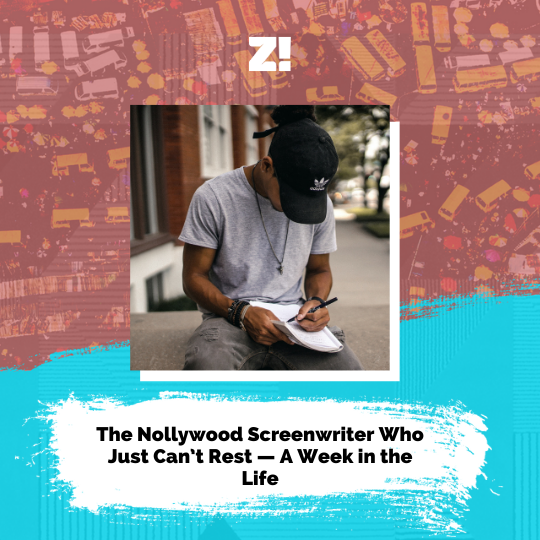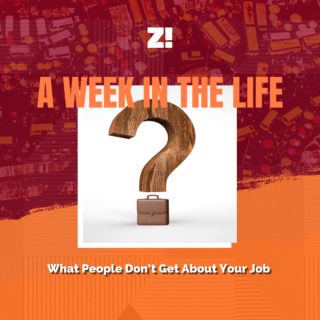A Week in the Life is a weekly Zikoko series that explores the working-class struggles of Nigerians. It captures the very spirit of what it means to hustle in Nigeria and puts you in the shoes of the subject for a week.
The subject of today’s “A Week in the Life” is a Nollywood screenwriter who got his first major screenwriting gig on the same day he quit his old job. We explore how he juggles multiple writing projects to make ends meet and why Nigerians need to calm down when criticising Nollywood.

MONDAY
One thing about this career is that it’s hard for me to rest. I worked all through last week and all weekend. So even though I told myself I’d use today to rest, I’m somehow in front of my laptop, working.
When I woke up this morning, I decided to sit in bed and open my laptop to watch films. It was all going fine and well when my brain started having thoughts. Next thing I knew, I’d written a pitch for a TV show.
This same thing that stresses me is also what’s cool about my job because my work also happens to be my passion. I live for creating ideas for films, series or skits. As long as it needs a script, you’ll find me there.
After that burst of energy, I freshen up, settle down and begin writing a breakdown of the show. Breakdowns are basically a scene-by-scene outline of everything that’ll happen in an episode of a show. Most of the work I get is on a contractual basis, so after developing a story and writing a pitch, I have to shoot my shot at producers. Then, I have to draft these scenes before sending them to other screenwriters to flesh them out.
When I write a new story, I like to draft an outline and write out every idea that comes to mind. Then I piece them together like jigsaw puzzle pieces. I grab cups of green tea while listening to my playlist that helps me get in my zone. Once I get into that zone, I’m laser-focused. I can only rest after I’ve completed the first draft.
I spend the rest of the day reviewing my breakdowns and editing them. I also edit scripts written by other writers, only stopping to eat lunch and stretch my muscles. By midnight, I’m exhausted. I manage to make it to my bed and sleep off.
TUESDAY
As a writer, life in Nollywood is stressful because I have to take on a lot of work simultaneously. I can be writing a TV show while writing movies on the side. So I have to compartmentalise my brain because I’m dealing with multiple stories and multiple characters simultaneously, making sure they don’t spill into each other. When I have a job that consumes a lot of my time, then I can take one other job, and even a third. But for shorter gigs, I joggle even more projects at once.
When I started my career, I struggled with doing multiple things. The ideal, productive way to work is to do one thing at a time. But handling multiple projects is like a muscle; when you work a muscle enough, you can do more things. Now, I’m used to the life. Even when I’m working on commissioned gigs, I’m also working on personal projects — I’m currently working on four projects in different genres.
I don’t like to limit myself because I like making different things. I study genres and sub-genres, so when I’m thrown into a situation, I want to be able to tap into something I know about a different genre or different style of writing.
When I was younger, I worked seven days a week, but as I got more settled in my career, I learnt to use my time more efficiently. I’m very close to 30 now, and so these days, I give myself at least one day of rest in a week. After the unplanned ginger of yesterday, I’ll give myself today to relax and chill.
But I never stop thinking about work.
WEDNESDAY
Every part of this job is stressful, but what stresses me out the most is the lack of job security.
Experts always advise young people to not quit their day job for their passions, but in 2016, that’s exactly what I did. Lucky me, I got my first screenwriting gig on the same day I quit a job that was paying me ₦44k per month. I’d been writing scripts for two years prior and sharing with people, but I never did it for money. When I decided to switch to full-time screenwriting, my first gig more than tripled my monthly earnings.
My first year on the job was smooth. I wrote a tonne of episodes, and people said good things about the show. I started carrying shoulder thinking I was the shit.
But in 2017? Crazy things were happening.
As a screenwriter in Nigeria, one always you have to think about is the next thing you’re going to do. There’s no time to rest on laurels or relax because once a show ends, you have to go find another job.
I used to believe that my work will always speak for me. Since I was good enough, I didn’t need to go around hawking my craft. I believed that the universe would always bring stuff to my doorstep.
Now that I’m much older and more experienced, I know I can’t just believe that things will always come to me just because I’m very good at what I do. People have to know that I am, and the only way for them to know is for me to go and show them.
For the first half of 2017, I got barely-paying offers. I also had health issues, so all the money I’d made the previous year was running out at breakneck speed. I had to start deliberately putting myself out there and selling my market shamelessly. I started going to writers’ workshops and events and demonstrating my ability.
Later in the year, someone who I’d connected with at one of these events recommended me for a gig with a producer I’d never worked with. Then I received a call and went to show how good at my stuff I am. Later on, I got signed to write for a major TV show that gave me the break I desperately needed and the job security that I didn’t have at the beginning of that year.
By 10 p.m., I get up from my desk, take one last cup of tea to get ready for bed.
THURSDAY
Today, I’m very frustrated because there’s been no light since Monday, and this fuel scarcity is becoming a real needle in my ass. I live in an area of Lagos serviced by Ikeja Electrical Premium, so I pay a higher tariff. For the past two years, I’ve enjoyed a decent power supply — 20 hours’ light minimum. I set up unlimited home internet so I can work comfortably from home and get into my “zone”. I don’t like going out or doing that thing where writers go to a coffee shop and type away because I don’t like noise around me when I’m working.
But since there’s no light, I have to go out. The coffee shop I go to is so distracting I can barely gather my thoughts. So I look away from my laptop and assess the other diners. The trio of friends closest to me is talking about a big-budget film that just flopped. I open Twitter to check if I can get the gist.
The news jumps out at me. People are PISSED. The whole of Nigerian social media is full of insults and banter. As a professional in Nollywood, this kind of criticism gets to me even if I’m not directly involved, so I zone out.
Thing is, even though the comments trigger me, I understand the discontent. When you eat at a restaurant and the service is poor, you have the right to come online and write a review. If you spend your money on something you don’t like, it’s annoying. But I wish people would understand we’re also human and though we’re doing our best, sometimes things go wrong.
The film industry is a money-driven artform, and Nollywood is still very small. The way movies typically make money is via cinemas, but Nigerians don’t even have a cinema culture. We’re a TV series nation that was raised on family TV shows and home videos.
Most Nigerians started going to cinemas in just the last decade, and it’s still a luxury over here because we live in a third-world country. How can we compare ourselves with the Hollywood and Bollywood cultures where the last two to three generations have always gone to cinemas to spend money?
How many Nigerians can afford to spend money on transport, movie tickets, popcorn, and go watch a movie every weekend? It becomes a risk on the part of the audience when they do decide to spend some thousands of naira to watch a film. It’s also a risk for filmmakers because the studios want to recoup as many profits as they can, which is why they invest in movie formulas that have been proven to work overtime.
Nollywood is still a young industry. But things are slowly changing, especially with streaming services, so filmmakers no longer have to rely solely on the box office. Streaming reaches more audiences without relying on movie ticket sales.
FRIDAY
IKEDC finally brought light today, thank God.
I was having a very productive workday when someone ruined it. I received a call in the afternoon that made me lose my shit.
There are two types of clients that frustrate me. On one hand are the clients who have no idea of what they really want. They’re so opinionated and never listen to me, the professional that they hired. Which is funny because how can you be so stubborn when you don’t even know the direction you want to take? And then there’s the second set of people — oh my God, these ones make me want to stick a fork in my eyes. They always want to pay peanuts for solid work.
The person who called me this afternoon belongs to this latter category.
He’d reached out to me last year to handle a scriptwriting project for him. And the amount he was offering for all the work required meant he was demanding slave labour. I refused it.
Today, he called and told me that he’d hired writers and they’d started the project, but they didn’t like what they were doing, and so they were starting again. But he still wanted me to collect small money. I’m laughing now sha, but at least he’s better than the producer who blocked me after I gave him my rates.
That one was trying to use the fact that we’re both Igbo to get me to collect chicken change. Are we in Onitsha market? Who is your brother please? Anyway, I took a breath and told him that if he couldn’t afford to pay me, I could ask other people, but I wasn’t going to accept that offer. He hung up and blocked me.
I see terrible things in this industry.
SATURDAY
If I wasn’t writing so many episodes, I would probably be behind the director on set, providing clarity on small details that make huge differences in the shows or adjusting the script to help writers deliver their lines better. But I can’t because I’m currently writing for a show with 260 episodes a year and simply don’t have the time. When I wake up this morning, I make a cup of green tea and jump right into work.
By the time I finish my second draft, it’s 5 p.m. already. I take a break and walk around my neighbourhood.
I’m grateful for the career I’d had so far working at my dream job. Look at me, working on a major network TV show and I’m not even 30 yet. But I still have fears: I’m so good at what I do, and I never want to be complacent. A shark has to keep moving because if it stops moving, it dies.
I would literally die if I stopped giving my all. That’s why I’m now trying new things. I’m now trying my hands at feature films.
I don’t know what’s ahead of me until I get there. And even if I can’t see the full vision for my career yet, let me sha be moving forward.
Hi, I’m Ama Udofa and I write the A Week in the Life series every Tuesday at 9 a.m. If you’d like to be featured on the series, or you know anyone interesting who fits the profile, fill out this form.




